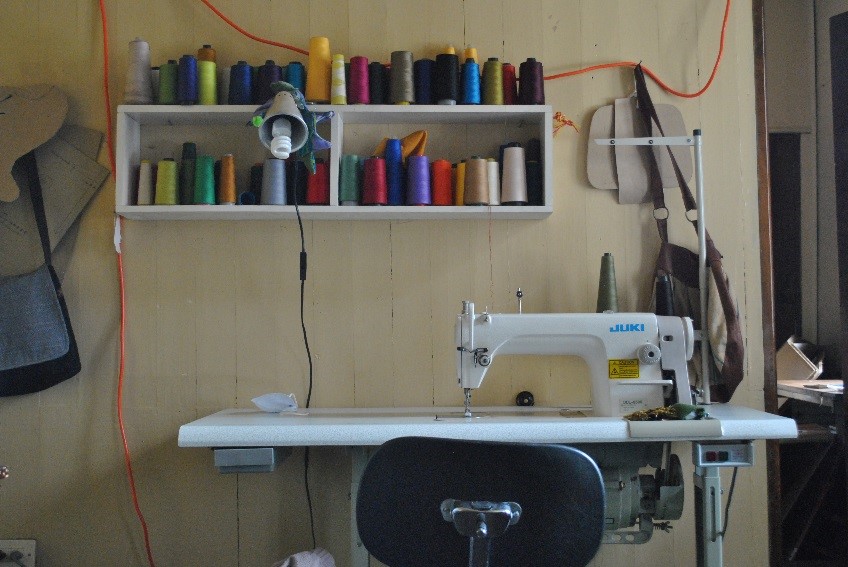
Using grant funds, Y’abal Handicrafts was able to purchase an additional industrial sewing machine
Every July, Aid to Artisans partners with canvas home™ to award a number of small grants to international artisan organizations. Those grants aim to help further develop and sustain their efforts to provide economic opportunities for vulnerable populations. This month, ATA followed up with some of these organizations and the progress they’ve made since winning the award in the fall 2014.
Haiti Projects, Inc.
Since 1994, Haiti Projects, Inc. (HP) has been empowering women in rural Haiti to “lift themselves out of poverty, become self-sufficient, and build community.” HP began as a family planning clinic, offering critical women’s health services to the region and now serves more than 30 villages through their mobile clinics.
Directly, the grant allowed HP to repair their sewing machines as well as buy irons and canvas for the Haitian artisans. HP was also able to purchase needles, scissors and other tools to aid in the process.
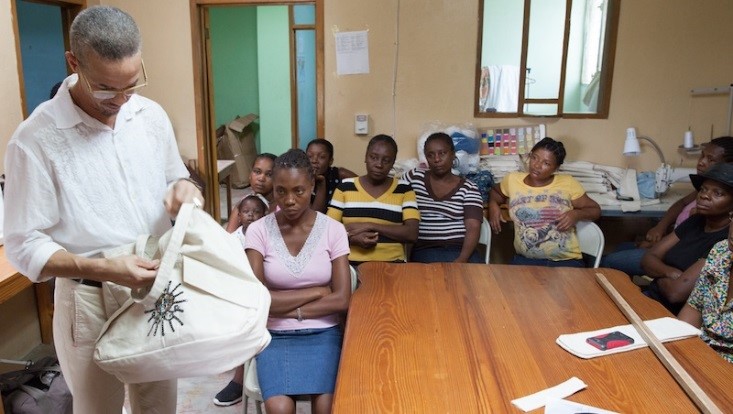
Designer Roberto Calasanz works with artisans in Haiti
Though the grant, HP was able to attract the attention of designer Roberto Calasanz from Artisan Business Network (ABN) to help guide the team on better design technique and workflow as they create new products. Through this partnership, HP was able to provide additional training for their artisans and incorporate new methods to increase efficiency and improve work flow, such as integrating music into the workday for the women HP works with.
Hands of Hope Artisan Carvers Self-Help Group (Kenya)
Hands of Hope Artisans Carvers Self-Help Group (HOHAC) was established in response to the tremendous number of vulnerable artisans, particularly women and youth. Located in the rural town of Tabaka, their goals are to improve lives as well as raising community living standards, healthcare opportunities and to promote education through fostering the talents of these vulnerable groups in the production and marketing of soapstone carvings, jewelry and post cards.

Artisan designing a bowl for Hands of Hope
With this grant, the group was able to purchase several items such as brushes, chisels, scissors, sand paper, files, and saws to help insure the production of high quality products and a digital camera, which has helped with marketing and selling their products. The group was also able to renovate their workshop by purchasing iron sheets that protect their artisans from direct sunlight and rainfall. Additionally, from the grant and part of the proceeds from their sales, the HOHAC project conducted a training workshop in product design for 10 artists in the Tumaini Maishani (Giving Hope in Life Project) based in Kisumu.
Since they received the grant, the total sales of the artisans increased by 40%. This increase enabled them to meet their families’ basic needs. This increase has helped improve their purchasing power to meet their families’ basic needs.
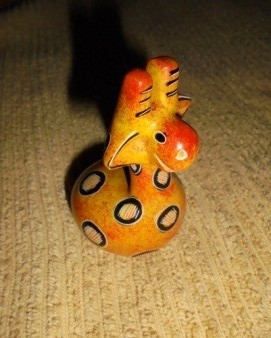
Giraffe figurine from Hands of Hope
“Initially we had cases of artisans going home without any money and their families sleeping hungry or lacking some basic household essentials,” says organization director Geoffrey Tamaro. “This is not the case anymore since all artists manage to get something at the end of the day. As a result of this, more children of the artisans have been sustained in school since they can acquire the school requirements like books and uniforms.”
Union of Artistic Crafts (Kyrgyz Republic)
Founded in 2011, the Union of Artistic Crafts was created to connect Kyrgyz artisans to larger markets both at home and abroad, in countries like Germany and the US. Union members consist of individual masters and craft groups who produce felt souvenirs, accessories, home décor, ethnic clothing, ceramics, jewelry, and interior and exterior décor.
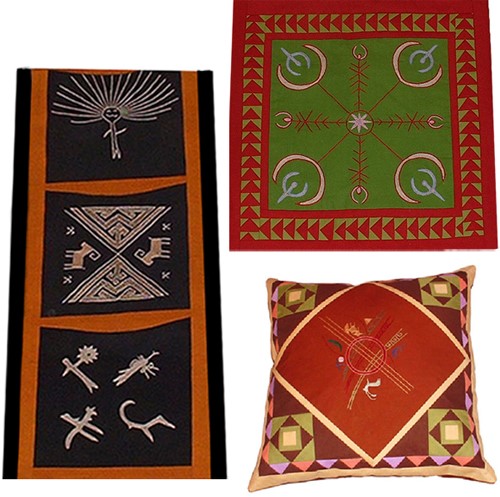
An example of work from Kyrgyz artisans
With the purchase of a printer, the grant has helped those within the group gain greater access to technologies that were not previously available such as developing marketing materials. This increased access has assisted the group in spreading information about forthcoming opportunities, including an exhibition in Milan. The grant has also allowed for the group to place their products in more commercial shops, which has exponentially amplified interest in the artisans’ work.
Y’abal Handicrafts (Guatemala)
Y’abal Handicrafts was founded as a Guatemalan NGO in an effort to provide emergency disaster relief to two coastal indigenous communities, Pacutama and Chuicutama, which were destroyed during Hurricane Stan in 2005. Since it was awarded the canvas home™ Small Grant, Y’abal Handicrafts was able to offer sewing classes to 8 community members and purchase an industrial iron and sewing materials for the workshop. With this workshop, offered to both the artisans they work with and the members of the community, those that did not have any experience gained quite a bit of skills in order to earn extra income.

Artisans working on sewing techniques
“While our focus is to provide income and work for the women in the weaving cooperatives,” says organization director Allison Havens. “Our larger holistic goal is to support the communities that we partner with through job opportunities (such as the weaving cooperatives) and extra social programs such as micro-credits and occasional job-training opportunities.”
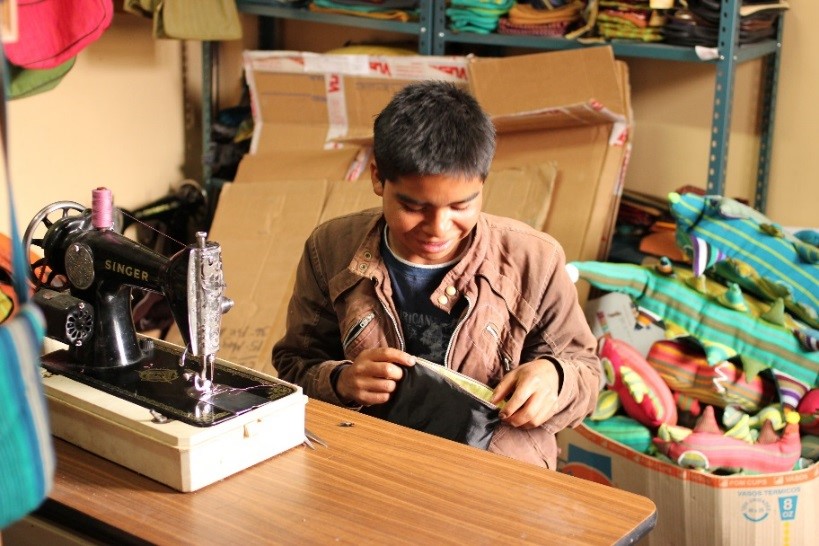
An artisan with Y’abal Handicrafts sewing a new product
In terms of the biggest impact specifically for Y’abal as a business, the purchase of an industrial sewing machine has been a huge improvement for the organization’s production efficiency.
“Without this grant we would not otherwise have been able to afford this type of investment. This investment into the efficiency of our production line is vital in allowing us to grow as a business and to take on more work. Often, one has to invest in a business first before it is able to grow, however this is difficult for businesses that don’t have that kind of capitol yet. The canvas home™ Small Grant from Aid to Artisans has given us that small push we needed in order to continue our growth towards self-sufficiency.”





